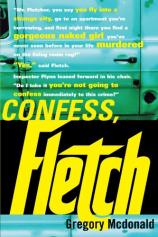Reading Group Guide
Discussion Questions
Confess, Fletch

1. In order to keep the stolen paintings, the art dealer Ronald Horan frames Fletch for Ruth Fryer's murder. What are the similarities between this kind of frame and a painting's frame? How does Horan's framing of Fletch create a picture that determines how others will view the reporter?
2. After Inspector Flynn discovers Horan's guilt, he says, "I suspect a more experienced policeman never would have suspected Mister Horan" [p. 182-3]. Why would inexperience give Flynn an advantage? What is Mcdonald suggesting about the ways in which conventional expectations distort reality?
3. How does Mcdonald keep the reader guessing about the identity of the real killer? How convincing are Fletch's descriptions [p. 158-165] of the possible motives and methods of the other suspects--Bart Connors, Joan Winslow, and Lucy Connors?
4. When Fletch, pretending to be a reporter for Trey Magazine, interviews Lucy Connors about her lesbianism, she asks him if he would be offended if she were his sister. Fletch replies, "Everybody should be what he or she is" [p 129]. How does a novel like Confess, Fletch depend upon people not being who they really are? Which characters are not who they appear to be? How does Fletch himself use false identities?
5. What kind of man is Inspector Flynn? What makes him such a brilliant detective? How has his childhood in Nazi Germany helped sharpen his investigative instincts? Why is he able to outsmart Fletch in finding the killer?
6. What kinds of female characters inhabit Confess, Fletch? What role do they play in advancing the plot? How does Fletch regard the women he encounters?
7. Gregory Mcdonald has observed, "Writing mysteries lets me get away with murder. I think 'the mystery' may be the greatest form for social criticism, simply because it is pedestrian."1 In what sense can Confess, Fletch be read as social criticism? What social ills are exposed in the novel? Why would its "pedestrian" status help make the mystery a potent form of social criticism?
For discussion of Fletch, Confess, Fletch, and Fletch's Fortune:
8. In what ways does Fletch's character evolve over the course of these three novels? How is he different in Fletch's Fortune than he is in Fletch? What traits remain constant in his character?
9. What methods of reasoning and investigation does Fletch employ in these novels to solve each crime? How does Mcdonald manage to keep the reader from knowing more than Fletch does? How surprising is the revelation at the end of each book?
10. Mcdonald has written, "The magic I attempt is to point the finger, as concisely as possible set the scene, then pull back my hand, disappear as the author, leave the reader alone with the characters."2 What is the effect of this kind of writing? Why is it especially useful in the mystery genre? Does this technique require more from the reader than other types of writing?
11. In addition to the narrative pull provided by the suspenseful investigation of a crime, Mcdonald's novels employ a narrative technique common to all great fiction: conflict. With whom or what is Fletch most often in conflict? How do these conflicts affect the reader's relationship both to Fletch and to the novels as a whole?
12. If you have read any of the work of Sir Arthur Conan Doyle, Raymond Chandler, and Dashiell Hammett, how does Fletch compare with other heroes such as Sherlock Holmes, Philip Marlowe, and Sam Spade? In what ways is he both like and unlike his predecessors? How has Mcdonald extended or put his own personal stamp on the mystery genre with the Fletch novels?
Confess, Fletch
- Publication Date: March 12, 2002
- Paperback: 192 pages
- Publisher: Vintage
- ISBN-10: 0375713484
- ISBN-13: 9780375713484







